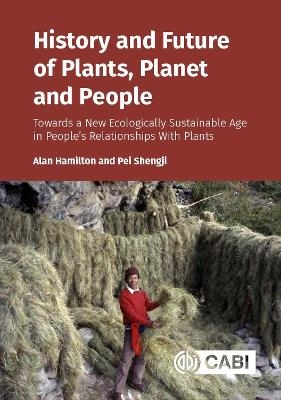
History and Future of Plants, Planet and People
CABI Publishing (Verlag)
978-1-78924-892-0 (ISBN)
This fascinating book presents the experiences and pooled knowledge of two very different conservation scientists; Pei Shengji from Sichuan, China and Alan Hamilton from London, UK. They have been drawn together over many years through working on some of the same conservation projects and have discovered that they overlap in their ideas about the sorts of work that needs to be done and how it can best be carried out. The book describes some of their own experiences, set within the contexts of their varied careers and the development of their thinking. Plant conservation is crucial to the preservation of natural ecosystems, but conventional approaches have met with only limited success. The authors have concluded that plant conservationists need social allies - elements of society that have other primary concerns, but whose efforts, if successful, will bring benefits to plant conservation too. It is the state and condition of plants on the ground that ultimately matter in conserving ecosystems, and therefore it is the role of local people who interact directly with them which enables success. Ethnobotany is a key skill required of practical plant conservationists. Its techniques enable them to explore connections between people and plants, learn about local perspectives and establish relationships with the people upon whom conservation and sustainable development relies. This book: recommends how to advance plant conservation, based on real experiences. will inspire more people to become involved in plant conservation. demonstrates how the very different backgrounds of the authors have influenced the courses of their careers, but have enabled them to come to very similar conclusions about conservation practice. demonstrates the importance of geographically-based biocultural diversity, as a counterbalancing force to globalisation.
Alan Hamilton (Author) Alan Hamilton has been a lecturer in botany, geography and environmental science, variously in the UK and Uganda. His research has been mainly on the environmental history of East Africa during the Quaternary, for which he was awarded a Doctorate in Science from the University of Cambridge. He served as Plants Conservation Officer for WWF-International (1989-2004) and as Plants Conservation and Livelihoods Officer for Plantlife International (2005-2008), in which roles he was responsible for many plant conservation projects around the world. He was one of the originators and the overall manager of the People and Plants Initiative (PPI) of WWF, UNESCO and the Royal Botanic Gardens, Kew, which aimed to increase global capacity in applied ethnobotany. One of his duties in PPI was to organise publication and distribution of a number of manuals on plant conservation in three languages (English, Spanish and Chinese). He is the recipient of an Honorary Doctorate from the Chinese Academy of Sciences and remains actively involved in conservation in China. He is the author of eight scientific books and about 100 scientific papers. Pei Shengji (Author) Pei is the father of modern ethnobotany in China, responsible for training and advising many students and researchers on how to work with communities for conservation and rural development. He is an expert on palms and was formerly the Director of Xichuangbanna Tropical Botanical Garden.
Part 1:: The challenge and the systems context 1.: Sustainable development: an existential challenge of our time (with a note on the Luganda language) 2.: Plants, planet and people – an overview Part 2:: Plants in human history 3.: Plants in human history to 1500 CE 4.: Cultural influences on people/plant relationships, Part 1 – worldviews 5.: Plants in human history since 1500 CE 6.: Cultural influences on people/plant relationships, Part 2 – post-1500 developments in Europe and the West 7.: Human knowledge of plants 8.: A history of plant conservation Part 3:: A suggested approach to plant conservation 9.: Principles and practice of ecosystem-based plant conservation Part 4:: Personal experiences in botany and conservation 10.: The People and Plants Initiative (1992-2005) 11.: The Medicinal Plants Conservation Initiative (2005-2008) 12.: The saga of rubber, Part 2 – the story in China and the founding of Xishuangbanna Tropical Botanical Garden 13.: Commercialisation of the Hani’s knowledge of fleagrass – a case study in access and benefit-sharing (ABS) in China 14.: Revitalising the traditional conservation practices of the Dai (China) 15.: Research into the environmental history of tropical Africa 16.: A conservation crisis caused by destructive logging in the East Usambara Mountains, Tanzania (1986-1987) and a sequel in Mexico (1988) 17.: Conservation and community knowledge, Mt Kinabalu, Malaysia (1992-1998) 18.: Conservation on the frontline: Bwindi Impenetrable Forest, Uganda (1966-2004) 19.: Resource conflicts at Ayubia National Park, Pakistan (1996-2004) 20.: Conservation and healing in Dolpo, Nepal (1997-2004) 21.: Conservation and development based on medicinal plants at Ludian, with an extension to the Meili Snow Mountain Range (China)
| Erscheinungsdatum | 15.10.2024 |
|---|---|
| Verlagsort | Wallingford |
| Sprache | englisch |
| Maße | 172 x 244 mm |
| Themenwelt | Naturwissenschaften ► Biologie ► Botanik |
| Naturwissenschaften ► Biologie ► Ökologie / Naturschutz | |
| ISBN-10 | 1-78924-892-2 / 1789248922 |
| ISBN-13 | 978-1-78924-892-0 / 9781789248920 |
| Zustand | Neuware |
| Haben Sie eine Frage zum Produkt? |
aus dem Bereich


